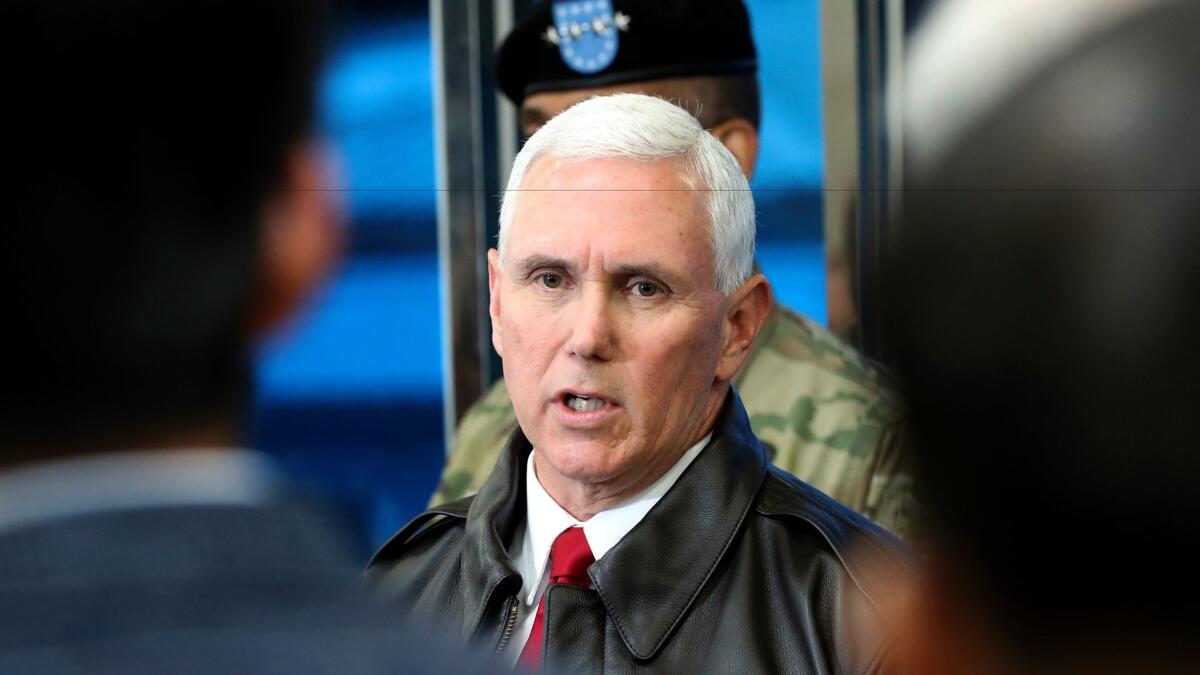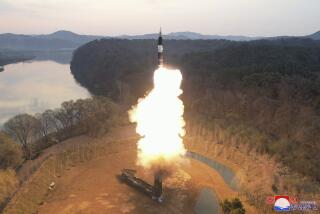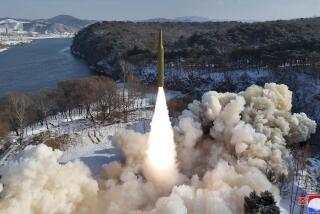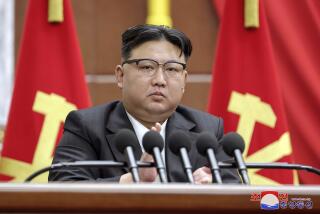Pence warns North Korea not to ‘test’ Trump, says the ‘era of strategic patience is over’

Vice President Mike Pence issued a blunt warning to North Korea about its nuclear program Monday, saying the United States would no longer adhere to a policy of “strategic patience” and that the authoritarian state should take a lesson from the Trump administration’s recent actions in Syria and Afghanistan.
“The era of strategic patience is over,” Pence said, referring to President Obama’s nonconfrontational approach to North Korea. “President Trump has made it clear that the patience of the United States and our allies in this region has run out and we want to see change. We want to see North Korea abandon its reckless path of the development of nuclear weapons, and also its continual use and testing of ballistic missiles is unacceptable.”
Pence’s comments came as part of a full-court press by the Trump administration to intensify pressure on North Korea.
North Korea has in recent weeks stepped up its testing of ballistic missiles — part of its overall goal of building a nuclear program capable of striking the U.S. mainland.
The vice president, in Seoul as part of a 10-day swing through Asia, said North Korea should remember that the United States recently bombed targets in Syria and Afghanistan, suggesting the Trump administration might be willing to take similar military action in the face of continued nuclear provocation from Pyongyang.
“North Korea would do well not to test his resolve — or the strength of the armed forces of the United States in this region,” Pence said of Trump.
At the same time, U.S. officials appear to be leaving the door open to diplomacy.
Susan Thornton, the acting assistant U.S. secretary of State for East Asian affairs, said the U.S. continues to hope that China will take a leading role in pressuring North Korea to abandon its nuclear proliferation efforts.
At a teleconference briefing with reporters Monday, Thornton also opened the door for possible negotiations with the North Korean government — but only if it showed “tangible change” in the way of freezing its nuclear program.
She wouldn’t specify what Pyongyang had to do to get the U.S. to engage in talks, but said launching additional missiles, as North Korea did over the weekend, was not the way to go.
The vice president spoke during a meeting with acting South Korean President Hwang Kyo-ahn on Monday, a day after he spent Easter Sunday with some of the 28,000 U.S. troops stationed on the peninsula. His comments were also delivered a day after North Korea unsuccessfully attempted to test launch a ballistic missile, in violation of international resolutions.
Also on Monday, Pence said the Trump administration remained committed to the deployment of the Terminal High Altitude Area Defense system in South Korea — an antimissile system designed to protect American allies in the region from the North’s medium-range missiles.
“We will continue to evolve a comprehensive set of capabilities to ensure the security of South Korea,” he said. “We will defeat any attack, and we will meet any use of conventional or nuclear weapons with an overwhelming and effective response.”
Pence’s visit and remarks come in the broader context of escalating tensions between the United States and North Korea. The communist state on Saturday paraded dozens of missiles and other military hardware in a show of its advancing military capability.
North Korea and South Korea maintain a tense relationship under a decades-old armistice. Some analysts fear an American strike could rekindle the deadly Korean War. About 25 million people live in and around Seoul, and its suburbs are within striking range of the North’s artillery.
Previous presidential administrations have struggled since the early 1990s with how to prevent the North from building or proliferating nuclear weapons. Those efforts have largely failed, with many security experts believing the country now has more than a dozen nuclear devices and an expanding capacity for delivering them from land- and sea-based missiles.
Obama’s “strategic patience” approach relied on a combination of pressure tactics, such as international sanctions, and covert actions to curb the North’s program. Although Pence said that era was over, he didn’t detail a new policy during his short remarks with the South Korean president.
“At every step of the way, North Korea answered our overtures with willful deception, broken promises, and nuclear and missile tests,” he said.
Pence said he was “heartened” by signs that China would use the “extraordinary levers” it has to pressure North Korea into giving up its nuclear ambitions. But he also reiterated Trump’s warning that the U.S. will act unilaterally if China fails to assist.
White House officials said they are encouraged that China, North Korea’s biggest benefactor, appears to be prepared to take a more aggressive role.
China this year suspended coal imports from the isolated nation. The Communist-run Global Times has recommended China also support sanctions to cut off oil supplies to North Korea if it conducts a sixth nuclear test.
Beyond the coal ban, officials have not stated what, if any, measures they have taken to rein in their rogue neighbor.
“We think that they’ve [the Chinese] gotten the message about increasing pressure,” Thornton said. “But it’s still quite early…. It takes time.”
Although China formally has agreed to U.N. Security Council sanctions against the North Korean government, it tends to bust those prohibitions and continue trade.
At his daily briefing, White House Press Secretary Sean Spicer said Trump’s efforts to push China to use its influence on North Korea “are paying off,” after a face-to-face meeting between the president and Chinese President Xi Jinping this month in Florida.
“I think you see China playing a much more active role,” he said. “There’s a lot of economic and political pressure points that I think China can utilize. And we’ve been very encouraged with the direction in which they’re going.”
Thornton, who spoke at an on-the-record teleconference briefing by a senior State Department official that has become rare since Trump came to power, stressed the urgency of the threat.
“The rate of testing and launching illegal technologies currently far surpasses anything that we’ve seen previously,” she said. “So there is a feeling that this is a very urgent and not just a local or a regional threat, but actually a global threat at this point.”
Chinese Foreign Ministry spokesman Lu Kang on Monday repeated his country’s calls for negotiations and a “peaceful solution” to escalating tensions.
“China is not the initiator of this issue,” he said, emphasizing that China’s desire for talks has been “a consistent approach, not something beginning today.”
The country’s top diplomat, Yang Jiechi, spoke by phone with Secretary of State Rex Tillerson on Sunday and “exchanged views” on the Korean peninsula situation, according to a statement by the Foreign Ministry.
The White House declined multiple opportunities Monday to further characterize the president’s thinking on North Korea, and refused to rule out any diplomatic or military response.
“He holds his cards close to the vest, and I think you’re not going to see him telegraphing how he’s going to respond to any military or other situation going forward,” Spicer said when asked if the president had a “red line” in mind that might prompt a military response.
Trump, speaking earlier in the day on Fox News, similarly declined to outline his thinking.
“I don’t want to telegraph what I’m doing or what I’m thinking,” Trump said. “We’ll see what happens. I hope things work out well.”
“Everybody has been out-played” by North Korean governments, he added.
In Tokyo, Japanese Prime Minister Shinzo Abe, speaking to a parliamentary session Monday, called for added pressure on North Korea, and urged China and Russia to play more constructive roles.
In Moscow, Kremlin spokesman Dmitry Peskov issued a muted statement urging calm.
“Our position is well-known and consistent. We are urging all the sides for restraint and urging all the countries to avoid any actions that could be qualified as a provocation. And we stand for continued coordinated international efforts in existing formats to settle the North Korean problem,” Peskov said, according to the Tass news agency.
Pence travels next to Tokyo followed by Jakarta, Indonesia, and Sydney, Australia.
Stiles reported from Seoul, and Wilkinson from Washington. Special correspondent Jessica Meyers in Beijing and staff writer Michael Memoli in Washington contributed to this report.
ALSO
North Korea puts its long-range missiles on parade in massive military show
Former Defense Secretary William Perry on why we didn’t go to war with North Korea
UPDATES:
2:00 p.m. This article was updated with comments from the State Department, White House spokesman Sean Spicer, and President Trump.
9:35 a.m.: This article was updated with additional comments from China.
6:45 a.m.: This article was updated throughout with staff reporting.
3:55 a.m.: This article was updated with information about Pence’s trip to Panmunjom on Monday.
This article was originally posted at 12:55 a.m.
More to Read
Start your day right
Sign up for Essential California for news, features and recommendations from the L.A. Times and beyond in your inbox six days a week.
You may occasionally receive promotional content from the Los Angeles Times.








